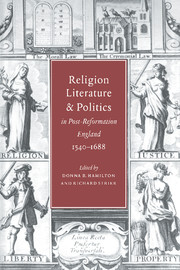Book contents
- Frontmatter
- Contents
- List of contributors
- Introduction
- 1 Sir John Oldcastle as symbol of Reformation historiography
- 2 The “sacred hunger of ambitious minds”: Spenser's savage religion
- 3 Subversive fathers and suffering subjects: Shakespeare and Christianity
- 4 Kneeling and the body politic
- 5 Donne and the politics of devotion
- 6 Catholic, Anglican or puritan? Edward Sackville, fourth Earl of Dorset, and the ambiguities of religion in early Stuart England
- 7 Crucifixion or apocalypse? Refiguring the Eikon Basilike
- 8 Marvell, sacrilege, and Protestant historiography: contextualizing “Upon Appleton House”
- 9 Entering The Temple: women, reading, and devotion in seventeenth-century England
- 10 Contextualizing Dryden's Absalom: William Lawrence, the laws of marriage, and the case for King Monmouth
- 11 Reformation in the Restoration Crisis, 1679–1682
- 12 Shadwell's dramatic trimming
- Index
12 - Shadwell's dramatic trimming
Published online by Cambridge University Press: 16 October 2009
- Frontmatter
- Contents
- List of contributors
- Introduction
- 1 Sir John Oldcastle as symbol of Reformation historiography
- 2 The “sacred hunger of ambitious minds”: Spenser's savage religion
- 3 Subversive fathers and suffering subjects: Shakespeare and Christianity
- 4 Kneeling and the body politic
- 5 Donne and the politics of devotion
- 6 Catholic, Anglican or puritan? Edward Sackville, fourth Earl of Dorset, and the ambiguities of religion in early Stuart England
- 7 Crucifixion or apocalypse? Refiguring the Eikon Basilike
- 8 Marvell, sacrilege, and Protestant historiography: contextualizing “Upon Appleton House”
- 9 Entering The Temple: women, reading, and devotion in seventeenth-century England
- 10 Contextualizing Dryden's Absalom: William Lawrence, the laws of marriage, and the case for King Monmouth
- 11 Reformation in the Restoration Crisis, 1679–1682
- 12 Shadwell's dramatic trimming
- Index
Summary
“Matters of state,” observed Charles II's poet laureate John Dryden, “are canvassed on the stage, and things of concernment there managed.” His literary and political nemesis Thomas Shadwell agreed that “plays and ballads have reform'd the state!” “'Tis thought the stage / Breeds more opinions, and produces far / More heresies than the late Civil War,” concurred another observer of Restoration drama. Using the same super-charged language, one of Shadwell's stage creations complained that “the wits are as bad as the divines, and have made such civil wars, that the little nation is almost undone.” Naturally each playwright accused his opponents of having politicized the stage. Thomas Otway, for example, writing immediately after the Exclusion Crisis, sneered that “it is not long since in the noisy pit / Tumultuous faction sat the judge of wit; / There knaves applauded what their blockheads writ. / At a Whig-brother's play, the bawling crowd / Burst out in shouts, as zealous, and as loud, / As when some member's stout election-beer / Gains the mad voice of a whole drunken shire.” After the Glorious Revolution, Thomas Shadwell countered that the stage was until recently dominated by the “loyal writers of the last two reigns, / Who tir'd their pens for Popery and chains.”
While it has long been known that Restoration drama was heavily politicized, very few scholars have asked serious questions about the political content of that drama.
- Type
- Chapter
- Information
- Publisher: Cambridge University PressPrint publication year: 1996
- 2
- Cited by



